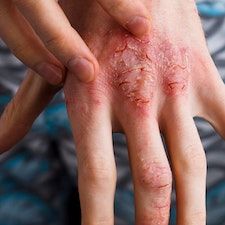Press Release
Article
Positive Long-Term Results Announced on Roflumilast Cream 0.15% for Atopic Dermatitis
Author(s):
This new data had both a consistent long-term safety and tolerability profile with the previous short-term results for the skin disease, and there were no new safety signals recorded.

Biopharmaceutical company Arcutis Biotherapeutics, Inc. announced the latest results from the long-term open-label trial known as INTEGUMENT-OLE, with roflumilast cream 0.15% being well-received for adult patients and children in the 6 years-and-above category who have atopic dermatitis (AD).1
Additionally, throughout the course of the 56-week treatment period, the study’s investigators found no new safety concerns. In fact, the efficacy was found not only to have been maintained but actually improved over time.
The INTEGUMENT-OLE investigators found that 46.1% and 51.0% of individuals who had rolled over from the treatment arm of the INTEGUMENT-1 or -2 trials ended up with a successful Investigator Global Assessment-Atopic Dermatitis (vIGA-AD). This is defined as a vIGA-AD value of 0 or of 1 in addition to a 2-grade improvement from the point of baseline, at 28 and 56 weeks, respectively.
“These results build upon the positive findings from the pivotal Phase 3 trials of roflumilast cream 0.15% in atopic dermatitis demonstrating rapid efficacy within the first 4 weeks of treatment… with continued improvement over the course of the long-term study,” Eric Simpson, MD, MCR, Professor of Dermatology and INTEGUMENT investigator, said in a statement.
Beginning from the fourth week of the INTEGUMENT-OLE trial, those who attained a vIGA-AD score demonstrating clarity (0) were then transitioned to a maintenance dosing regimen of twice per week. The study participants were asked to then return to their once-daily dosing provided that their vIGA-AD score was able to reach the mild level of 2 or if their symptoms were not found to be effectively managed.
The investigators noted that a substantial majority of individuals who ended up making the transition to maintenance dosing had adhered to the twice-weekly schedule for more than half of the total duration in the study following the fourth week.
“These study results provide evidence for a paradigm shift to break the cycle of the current topical paradigm that only reactively chase and manage flares, showing the utility of infrequent preventive treatment regimens to disease control,” Emma Guttman-Yassky, MD, PhD, System Chair and Waldman Professor of Dermatology and Immunology at the Icahn School of Medicine at Mount Sinai said in a statement.
Additionally, the research team observed that 61.5% and 66.2% of those who transitioned from using roflumilast cream at the time of the INTEGUMENT-1 or -2 trials showed a 75% enhancement from their first Eczema Area and Severity Index (EASI-75) score at the 28-week and 56-week points, respectively.
The INTEGUMENT-OLE study, or 'INterventional Trial EvaluatinG roflUMilast cream for the treatmENt of aTopic dermatitis Open Label Extension,' was a multicenter, phase 3, open-label extension research initiative.
Eligibility for participant recruitment in this research was extended to those who had completed either the INTEGUMENT-1 or INTEGUMENT-2 trials, amounting to a total number of 658 participants, with varying durations of trial participation either at 24 or 52 weeks.
Arcutis plans to file a supplemental New Drug Application (sNDA) towards the end of the third quarter in 2023, with the application pertaining to the usage of roflumilast cream 0.15% for addressing mild to moderate atopic dermatitis in the age group studied in INTEGUMENT-OLE.
References
- Arcutis Biotherapeutics, Inc. Arcutis Announces Positive Long-Term Results of Roflumilast Cream 0.15% Showing Durable and Improved Efficacy Over Time and Favorable Safety Profile in Treatment of Mild to Moderate Atopic Dermatitis (AD). https://www.arcutis.com/arcutis-announces-positive-long-term-results-of-roflumilast-cream-0-15-showing-durable-and-improved-efficacy-over-time-and-favorable-safety-profile-in-treatment-of-mild-to-moderate-atopic-dermatitis/. Published September 7, 2023.





